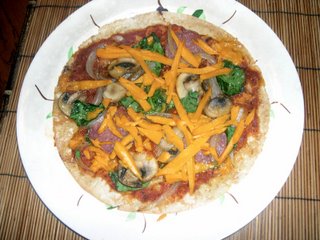Pandora's Box
Dear readers:
I understand your concerns over cross contamination. I've done a lot of research on the matter of cooking oils, and here's the bad news: all vegetable oils, except for some brands of olive oil, are bottled in facilities that also bottle nut oils. Yes, that's right,
all oils. Call the Allergy Grocer, and they'll tell you the same. If you call around to the various oil manufacturers, they'll reveal this horrible truth. Spectrum just happens to declare it. Most companies don't. Even California Rice Bran Oil, which is often recommended as a risk-free oil bottles along with nut oils. If you follow this to its ultimate conclusion, this means that even allergen-free products made in dedicated allergen-free facilities still often contain oil, and if they do, that oil was bottled in a facility with nut oil. So if you're eating an allergen-free cookie that contains canola oil, or safflower oil, or any other type of oil, that canola oil or safflower oil was bought from another manufacturer where they bottled it along with nut oils. And I'm sure I'll get an angry email about this calling me a spoiler, but I'm telling the truth, no oil (except for olive), and no product made with oil is 100% risk-free. Dedicated allergen-free foods are a wonderful thing, but they don't have to declare anything about the manufacturing practices of their raw ingredients.
I don't mean to be an alarmist here. Truly, you could take this info and it might make you never want to eat again, considering that vegetable oil is used in all restaurants, and most prepackaged products on the market. But there is some good news.
The good news is that some oil and shortening manufacturers practice extremely strict manufacturing practices where they flush the lines. You can make yourself a lot more secure by educating yourself about which brands practice GMP (good manufacturing practices) and HACCP (hazards and critical analysis control points) as well as finding allergen-free dedicated plants and dedicated lines.
Again, though Spectrum (please bare with me to the end of this) does list a disclaimer, if you call them or go to their website, they'll tell you "Spectrum has never had an allergy problem arise from the use of its oils. However, some of our oils do share equipment with that which has been used to process nut oils". Additionally, they will tell you that though they bottle several nut oils, that these oils come to them already pressed, ready to be bottled, meaning that the actual nut or fiber from the nut is not present in their manufacturing plant (meaning the peanut or nut proteins are not present in the plant, just the oil). The oils do share an immediate finishing line and filler with their flaxseed oil. From Spectrum: "To prevent any cross contamination, Spectrum thoroughly flushes the filling lines between the bottling of our different types of oils. In addition, we also flush many pounds of the new oil to be bottled through the lines and filler before actually bottling the new oil".
California Rice Bran Oil has the same flushing practices. I, for one, feel much safer with a company like Spectrum or California Rice Bran Oil that has addressed the issue, and gone to the effort to take huge precautions to avoid cross-contamination than one who hasn't even bothered to mention the disclaimer on their label. Because again,
all these oil manufacturers are bottling in facilities with nut oils, and they always have. My hunch is that the manufacturers who list the warning may in fact be a safer bet than the ones that don't. For example, a large company that uses shared lines but has allergen policies, and HACCP procedures in place (which most large companies do) may in fact be safer than a small company using dedicated lines. And FYI, Spectrum is not a small company at all, they are owned by Hain Celestial.
And no, my son does not have a peanut or a tree nut allergy. He has a dairy allergy (and used to have a soy allergy, which he has outgrown). He has never been exposed to either peanuts or tree nuts, and thus has never had the protein introduced, thereby creating the allergy. I have been very careful to keep him away from peanuts and tree-nuts, because as I'm sure you know as other food allergy parents, the child must be exposed at least once to the allergen for the immune system to create the antibodies against the offending allergen. I have purposefully kept my sons away from peanuts and tree-nuts so that they will not develop either allergy. My son Lennon is a hyper-allergic individual, and I avoid peanuts, tree-nuts, and shellfish like the plague.
About Sponsorship:
I was not sponsored by Spectrum when I wrote my cookbook. But I did use Spectrum products. At that time, there was no mention of bottling along with nut and peanut oils on their labels. I used their oils, because I and my publisher thought they had the lowest risk of cross-contamination due to their strict cleansing practices (which i still believe to be true). Again, they go so far as to say on their website:
"Spectrum has never had an allergy problem arise from the use of its oils."After my book came out, they wished to sponsor me. But labels have changed in the past year. And due to this, I have been hesitant to recommend any of their products but the Organic All Vegetable Shortening. The reason I have continued to use this shortening in my recipes is because it is the only soy-free, dairy-free, tree nut-free, peanut-free shortening on the market (that I have found). I have been told on repeated occasions that it is manufactured and also packaged in Columbia, not in the US in the bottling plant with the Nut Oils. I was last told this in May, 06. However, they can not promise that it is 100% risk free (as nobody really can). When I called Hain Celestial again today, they wouldn't give me any info at all, saying that consumer relations is not privy to information about where a product is packaged, and that they will not guarantee that it's risk free. Smart for them, but extremely frustrating for all of us. I wish I could find just one vegetable oil or shortening product that was 100% risk free of every possible allergen, but I can't make that promise, because nobody can make it to me. So ultimately, it's up to every individual to call manufactures on their own (as I've said many times before), to ask about the GMP, and HACCP....
I am trying to help you, not harm you. Only you know what your own comfort level is, and how severe your or your loved one's allergy is. Not to mention the fact that manufacturing practices change frequently, sometimes on a weekly basis. So even if I know something this week, I won't know if it's true next week.
I think the most important thing to do is to try to be educated. Learn these manufacturing terms. But most importantly, make sure you always have epi-pens, and that whomever is taking care of your child has epi-pens, and truly knows how to use them. Because there is no way to live a completely risk-free life, but we can be prepared, if the risk suddenly presents itself.



